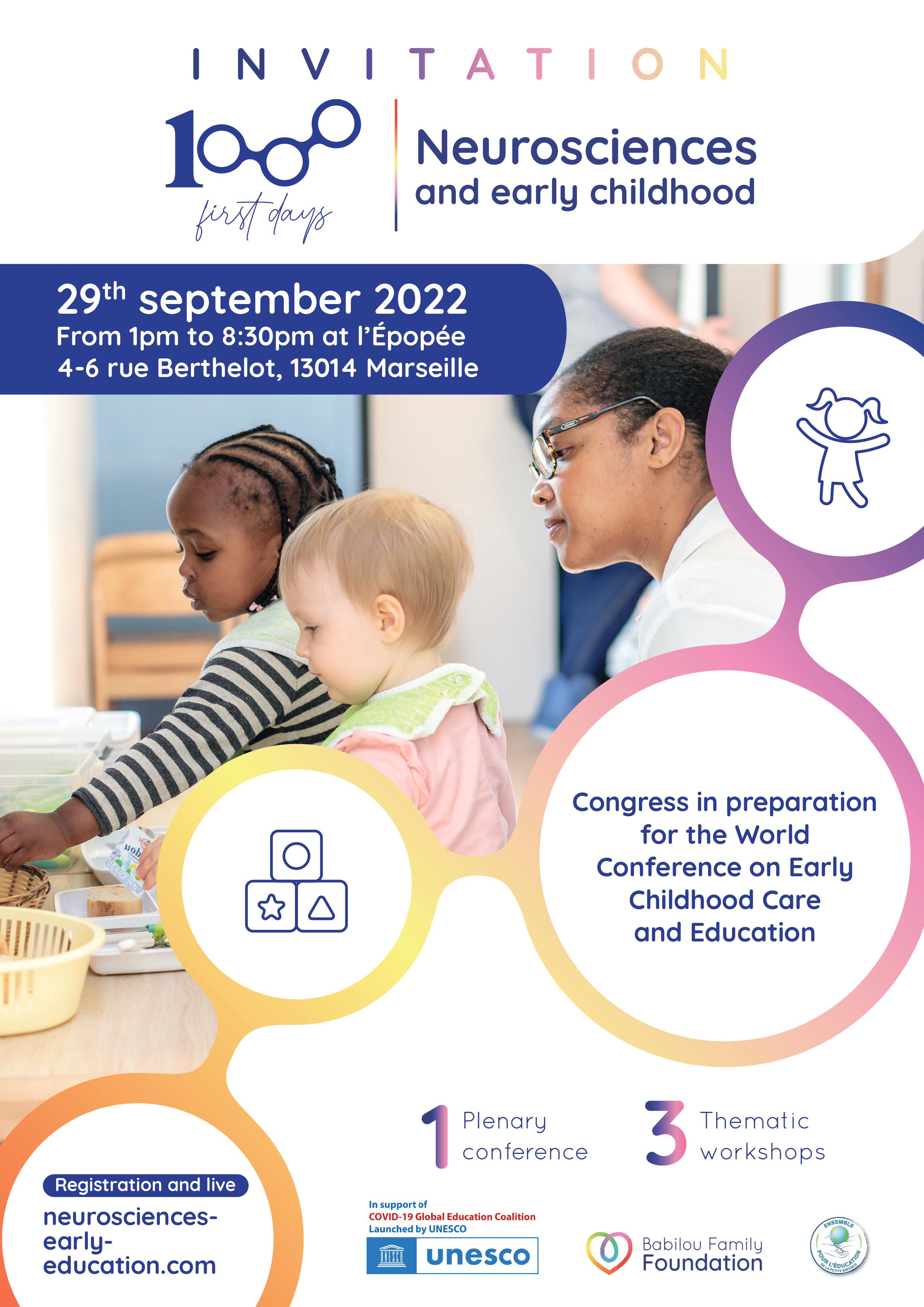1000 days, Neuroscience and early childhood Congress
Congress dedicated to the influence of neuroscience on early childhood care and education on Thursday, September 29, 2022 at L’Épopée in Marseille

Babilou Family Foundation and UNESCO, with the support of Ensemble for Early Childhood Education France, in preparation for the World Conference on Early Childhood Care and Education (WCECCE) in November 14-16, 2022 in Tashkent, Republic of Uzbekistan
On 29 September, the Babilou Family Foundation and UNESCO Global Education Coalition with the support of Ensemble for Early Childhood Education France are hosting the 1st Congress on the Influence in Marseille.
The Congress on the influence of neuroscience on young children’s development is a meeting aimed at lying the groundwork for the World Conference on Early Childhood Care and Education (WCECCE) to be held from 14 to 16 November 2022 in Tashkent, in the Republic of Uzbekistan.
Neuroscience is key in determining the necessary conditions for toddlers’ development and fulfilment. It also plays a major role in the way the first 1,000 days of a child’s life are apprehended. In order to take advantage of all the works in the filed and to bring together the world of research and stakeholders, the Congress will gather renowned international neuroscientists alongside public and private players, filed professionals, and experts, all of whom are committed to spearheading a genuine educational revolution from early childhood onwards.
Through key concepts such as language. multilingualism. or the exposure of young children to screens. this Congress will address essential issues. such as:
- The contribution of neuroscience in the adaptation of care and educational practices in nurseries.
- How neuroscience can contribute to reducing social inequalities.
- Raising awareness and training for early childhood professionals to become more familiar with the field and its research.
A contribution of the Congress to the World Conference on Early Childhood Care and Education (WCECCE)
Babilou Family is convinced that the development of sustainable and responsible ecosystems requires close collaboration between public institutions and private actors. The Group. which is present in 12 countries around the world. is proud to commit to UNESCO and its partners for the sustainable education of future generations.
Following this Congress. Babilou Family will participate in the World Conference on Early Childhood Care and Education (WCECCE) organized by UNESCO. which aims to reaffirm the right of all young children to quality care and education from birth to age8. and to encourage Member States to invest in target 4.2 of the Sustainable Development Goals (SDG). It consists of "ensuring that by 2030. all girls and boys will have access to quality early childhood development. care and pre-primary education so that they are ready for primary education". By bringing together public institutions and private actors just a few months before the World Conference. the Congress will provide them with an opportunity to work together on strategic issues and craft innovative solutions that will be presented at the World Conference in Tashkent.
In France. the early childhood field relates to 4.5 million young children. including 2.2 million under the age of 3. The challenge posed by territorial and social cohesion is thus immense in scale. In the absence of other available childcare solutions. about 60% of children under 3 are still cared for mainly by their parents. their family. or relatives. The remaining 40% of children are split between childcare provided by childcare assistants (nearly 20%). collective childcare (approximately 13%) and other types of childcares. More than 40% of requests for places in childcare facilities are not met in France. meaning that less than one in two requests for a place in childcare is met. The availability of formal care - all types of care combined - varies greatly from one French department to another. ranging from 6 to 66 places for every 700 children under age 3. According to the think tank Terra Nova. only 5% of working-class children currently have a place in a daycare center. compared to 20% of children from privileged backgrounds.
More than 43% of children under the age of 5 globally are at risk of not reaching their full development potential. according to UNICEF. Several factors were considered by the international organization to guide its programs related to early childhood development in early 2077: the poverty and malnutrition-related risks they face. as well as the lack of access to basic services and early enrichment opportunities.
Participants: About 170 participants in person and 7000 online participants expected. International neuroscientists. persons committed to early childhood education and care. professionals in the field. public and private stakeholders. and think tank representatives. among others. will be invited.
The event will be streaming live and the official working languages throughout the duration of the Congress will be French and English.
In order to participate online register on the official website of the event: https://www.neurosciences-early-education.com/fr/